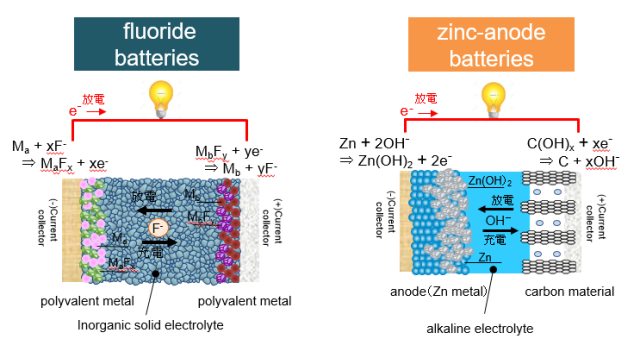Research and Development Initiative for Scientific Innovation of New Generation Batteries 3
To achieve widespread use of electric vehicles (EVs) with prices and specifications equivalent to gasoline cars, further technological innovation in batteries is necessary. In this project, research and development are conducted on "Fluoride Batteries" and "Zinc-Anode Batteries," which use inexpensive materials with fewer resource constraints compared to lithium-ion batteries (LIBs) while achieving high energy density and safety. By early practical application of these batteries for EVs and plug-in hybrid electric vehicles(PHEVs), the aim is to contribute to the maintenance and improvement of competitiveness in the automotive and battery industries. The project involves collaboration among industry, academia, and government, addressing common foundational technologies from material development to battery design, prototyping, characteristic evaluation, and analysis.
Research and Development
R&D Item [1] Fluoride Battery Research and Development
R&D Item [2] Zinc-Anode Battery Research and Development
Considering the achievements of the previous project (Development of Basic Technology to Promote the Practical Application of Innovative Storage Batteries), particularly the high potential in energy density, safety, and Japan's uniqueness, two types of batteries are targeted for research and development: the "Fluoride Battery" and the "Zinc-Anode Battery," both of which offer advantages in safety and cost reduction.
Specifically, the project aims to develop high-performance and low-cost electrode active materials and electrolytes using elements with fewer resource constraints and procurement risks compared to lithium and cobalt used in LIBs. It also focuses on the research and development of common foundational technologies that address electrode structure development, cell design, prototyping, and characteristics examination and analysis. The examination results are incorporated to develop simulation techniques predicting cell charge and discharge performance. A comprehensive evaluation is conducted to ensure that participating companies can continue practical development after the project's conclusion and achieve commercialization benchmarks such as battery packs.
Due to the extremely high degree of difficulty in achieving the targets for both battery types, the project is implemented through industry-academia-government collaboration among universities and public research institutions with expertise in advanced material science and analysis techniques, battery manufacturers, including storage battery manufacturers with an extensive track record in the development and commercialization of automotive batteries, and automobile manufacturers as end-users. In addition, NEDO manages the project to create a positive cycle of knowledge among these players, aiming to achieve a technological breakthrough for the practical implementation of innovative onboard batteries.
-
 The developed Fluoride Battery
The developed Fluoride Battery
and Zinc-Anode Battery
Basic information
| Technical field |
|
|---|---|
| Project code | P21006 |
| Department in charge |
|
Last Updated : July 1, 2024
